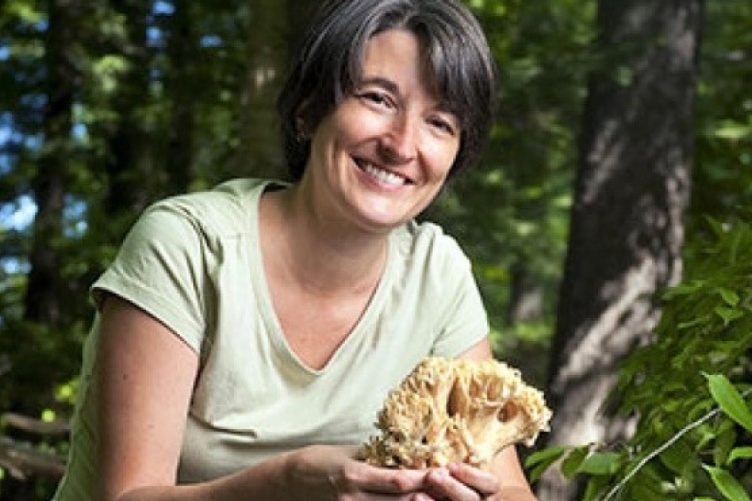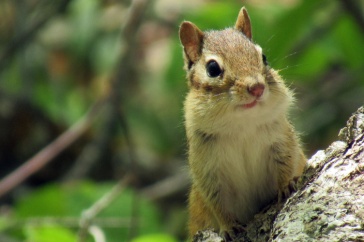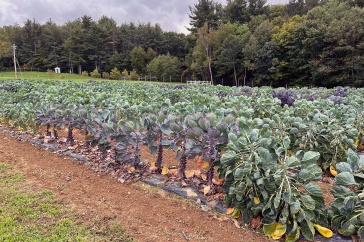
Serita Frey, professor of soil microbial ecology at the University of New Hampshire and a researcher with the New Hampshire Agricultural Experiment Station, has been named one of the most highly cited researchers in the world, a prestigious distinction earned by fewer than 0.1 percent of scientists globally.
Serita Frey, professor of soil microbial ecology at the University of New Hampshire and a researcher with the New Hampshire Agricultural Experiment Station, has been
|
“The Highly Cited Researchers list contributes to the identification of that small fraction of the researcher population that contributes disproportionately to extending the frontiers of knowledge. These researchers create gains for society, innovation and knowledge that make the world healthier, richer, more sustainable and more secure.” |
named one of the most highly cited researchers in the world, a prestigious distinction earned by fewer than 0.1 percent of scientists globally.
“Serita’s exceptional research influence reflects her intellectual caliber and dedication to her field. She is a leader within the university’s research community and within that of her professional community. I am thrilled that she has been recognized as being a member of this elite group of global scientists who are committed to solving the world’s most pressing ecological challenges,” said Dr. Jon Wraith, dean of the UNH College of Life Sciences and Agriculture, and director of the NH Agricultural Experiment Station.
Each year, the Web of Science Group identifies the world’s most influential researchers. These scientists are the select few who have been most frequently cited by their peers in the most prestigious scientific, peer-reviewed journals over the last decade. In 2019, fewer than 6,300, or 0.1 percent, of the world's researchers, across 21 research fields, earned this exclusive distinction. The methodology that determines the who’s who of influential researchers draws on the data and analysis performed by bibliometric experts from the Institute for Scientific Information at the Web of Science Group.
This year’s list includes 23 Nobel laureates and 57 citation laureates -- individuals recognized by the Web of Science Group, through citation analysis, as “of Nobel class” and potential Nobel Prize recipients. The United States is home to the highest number of highly cited researchers, with 2,737 authors, representing 44 percent of the researchers on the list.

genomic analysis.
“Recognition and support of these exceptional researchers represents an important activity for a nation or an institution’s plans for efficient and accelerated advancement. The Highly Cited Researchers list contributes to the identification of that small fraction of the researcher population that contributes disproportionately to extending the frontiers of knowledge. These researchers create gains for society, innovation and knowledge that make the world healthier, richer, more sustainable and more secure,” David Pendlebury, senior citation analyst at the Institute for Scientific Information said.
Frey’s research looks at microorganisms in soil and how they respond to environmental changes caused by human activities. Specifically, she and her lab are interested in how climate change, nitrogen deposition, agricultural management, and invasive species affect the composition and diversity of soil microbial communities and microbial-mediated carbon and nitrogen cycles. She describes her research as “at the small end of the scale. Even though I’m working at the microbial scale, my research really tries to bridge the micro and the macro.”
Her research team maintains five long-term global change experiments at the Harvard Forest Long-term Ecological Research (LTER) site and a statewide, distributed soil sensor network in New Hampshire.
Frey received her bachelor’s and master’s degrees from the University of Virginia and her Ph.D. from Colorado State University. She is editor-in-chief for Issues in Ecology. Her honors include UNH Outstanding Associate Professor of the Year, Distinguished Ecologist Alumna Award from the Graduate Degree Program in Ecology at Colorado State University, Bullard Fellowship from Harvard University, and an NSF Faculty Early Career Development Award.
Founded in 1887, the NH Agricultural Experiment Station at the UNH College of Life Sciences and Agriculture is UNH’s original research center and an elemental component of New Hampshire's land-grant university heritage and mission. We steward federal and state funding, including support from the USDA National Institute of Food and Agriculture, to provide unbiased and objective research concerning diverse aspects of sustainable agriculture and foods, aquaculture, forest management, and related wildlife, natural resources and rural community topics. We maintain the Woodman and Kingman agronomy and horticultural research farms, the Macfarlane Research Greenhouses, the Fairchild Dairy Teaching and Research Center, and the Organic Dairy Research Farm. Additional properties also provide forage, forests and woodlands in direct support to research, teaching, and outreach.
The University of New Hampshire, which is ranked number two in North America for ecology research, is a flagship research university that inspires innovation and transforms lives in our state, nation, and world. More than 16,000 students from all 50 states and 71 countries engage with an award-winning faculty in top ranked programs in business, engineering, law, liberal arts and the sciences across more than 200 programs of study. UNH’s research portfolio includes partnerships with NASA, NOAA, NSF and NIH, receiving more than $100 million in competitive external funding every year to further explore and define the frontiers of land, sea and space.
-
Written By:
Lori Wright, '06G | NH Agricultural Experiment Station | lori.wright@unh.edu | 16038621452
















































